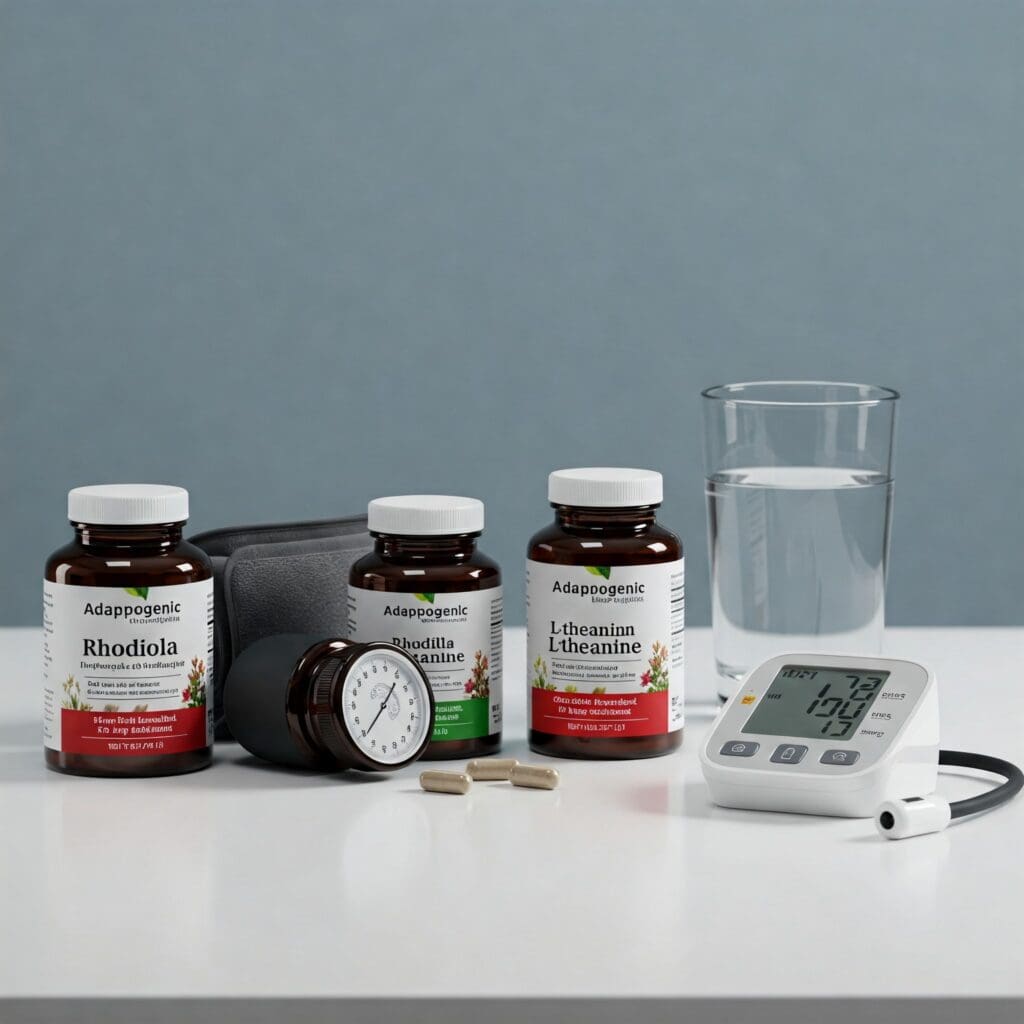Introduction: Why Lowering Cortisol Matters for Health and Weight
Cortisol, often referred to as the “stress hormone,” plays a central role in how the body responds to both physical and emotional stress. While cortisol is essential for survival, chronically elevated levels can lead to a cascade of health concerns, including anxiety, poor sleep, metabolic imbalance, and abdominal fat retention. For individuals pursuing a more natural, holistic approach to health, learning how to lower cortisol levels naturally is a critical step toward restoring energy, improving mood, and achieving sustainable weight management. Particularly for those struggling with persistent fatigue or belly fat that seems resistant to diet and exercise, understanding the connection between cortisol and body composition can be transformational.
You may also like: The Best Supplements for Weight Loss: Natural Vitamins, Herbs, and Products That Help Women and Men Burn Fat Safely
Within the realm of herbal medicine and adaptogenic support, numerous options exist to help manage stress and promote hormonal balance. The rising popularity of cortisol supplements, adaptogens, and cortisol detox strategies highlights a growing interest in natural pathways to hormone regulation. As we explore how to reduce cortisol effectively, it becomes evident that successful outcomes depend on a combination of lifestyle strategies, dietary patterns, and the right supplements for high cortisol. Whether you’re looking to prevent burnout, support a cortisol detoxification process, or find the best cortisol supplement for women dealing with hormone fluctuations, this guide provides science-backed insights and actionable tools for reclaiming hormonal harmony.

The Physiology of Cortisol: Understanding the Stress-Fat Connection
Cortisol is produced by the adrenal glands and is released in response to stress via activation of the hypothalamic-pituitary-adrenal (HPA) axis. In small amounts, it plays essential roles in regulating metabolism, blood pressure, immune function, and circadian rhythm. However, when the body is under chronic stress—whether due to poor sleep, inflammation, anxiety, overexercising, or nutrient deficiencies—cortisol levels can remain persistently elevated. This creates a hormonal environment that encourages fat storage, particularly in the abdominal region, and suppresses fat burning mechanisms.
Understanding how to get rid of cortisol belly fat naturally requires an appreciation of how cortisol disrupts insulin sensitivity and impairs thyroid function. When cortisol is high, the body becomes less responsive to insulin, which promotes fat storage. At the same time, cortisol can interfere with sleep, which further increases appetite-regulating hormones like ghrelin while reducing leptin, the hormone responsible for satiety. The result is an increased likelihood of emotional eating, cravings for high-calorie foods, and fat gain in the midsection.
Many people searching for how to reduce cortisol belly or what supplement helps keep cortisol down are unaware of the broader physiological impact cortisol has on systems ranging from digestion to mental health. Elevated cortisol depletes important neurotransmitters such as serotonin and dopamine, contributing to low mood and reduced resilience. This makes the quest to find the best supplement to lower cortisol not just a matter of weight loss, but of total mind-body restoration. Holistic solutions must take into account the interconnected nature of cortisol’s effects throughout the body.

What Foods Trigger Cortisol and Which Ones Help Reduce It
The relationship between food and cortisol is complex, but compelling. Chronic stress and poor dietary choices can amplify cortisol production, while anti-inflammatory, nutrient-dense foods may help bring it back into balance. Processed sugars, refined carbohydrates, trans fats, alcohol, and excessive caffeine are among the top cortisol-triggering foods. These items place stress on the liver, destabilize blood sugar, and promote inflammation—all of which stimulate the HPA axis to produce more cortisol.
Conversely, foods rich in magnesium, B vitamins, vitamin C, and omega-3 fatty acids support adrenal health and help regulate the stress response. For individuals wondering what foods have cortisol-lowering potential, options like leafy greens, avocados, wild-caught fish, fermented vegetables, and dark berries are excellent choices. These whole foods are not only nutrient-rich but also support the gut-brain axis, a crucial channel for modulating mood and hormonal output.
An overlooked aspect of how to lower cortisol levels naturally is blood sugar stability. Frequent blood sugar spikes and crashes place stress on the body and trigger cortisol release. Choosing complex carbohydrates, healthy fats, and clean proteins throughout the day supports balanced energy and hormone regulation. The best supplements for cortisol often work synergistically with a balanced diet, amplifying results when nutritional foundations are in place. In this way, a cortisol detox isn’t about deprivation, but about replenishing the body with what it truly needs to thrive.

The Role of Supplements in Lowering Cortisol and Belly Fat
While lifestyle changes and dietary shifts are foundational, high-quality supplements can play a key supportive role in managing cortisol. Adaptogenic herbs like ashwagandha, rhodiola rosea, holy basil, and schisandra are among the most researched natural compounds for their ability to help the body adapt to stress and recalibrate hormonal output. For those seeking what supplements lower cortisol with both safety and evidence, adaptogens are a strong starting point.
Magnesium is another essential nutrient in this context, frequently included in discussions around supplements for high cortisol. Not only does magnesium support the parasympathetic nervous system—helping the body relax—but it also plays a role in regulating adrenal output. The question “does magnesium lower cortisol” is met with growing clinical support, particularly for individuals experiencing insomnia, muscle tension, or anxiety. B-complex vitamins and phosphatidylserine are also found in many formulations labeled as the best cortisol supplements for weight loss because they support brain-adrenal communication and reduce the cortisol burden under chronic stress conditions.
When looking for the best supplement to reduce cortisol and belly fat, it’s important to evaluate products for ingredient transparency, dosing accuracy, and third-party testing. Many of the best cortisol supplements for women also include hormone-balancing nutrients like vitamin D, zinc, or chasteberry to address the interplay between cortisol and estrogen dominance. Overall, the most effective supplements to decrease cortisol are those that not only target stress reduction but also nourish adrenal resilience over time.
Lifestyle Habits That Support Natural Cortisol Detoxification
A sustainable approach to how to decrease cortisol levels naturally involves more than just what goes into your body—it also includes how you move, think, and rest. Movement, particularly low-impact exercise such as walking, yoga, and swimming, can lower cortisol levels by promoting circulation, endorphin release, and lymphatic drainage. However, excessive high-intensity workouts, especially in individuals already under stress, can become counterproductive and elevate cortisol further. The key is moderation and listening to your body.
Sleep is one of the most powerful natural regulators of cortisol. When sleep is disrupted or insufficient, the body produces more cortisol the following day, setting off a cycle of fatigue, cravings, and stress. Improving sleep hygiene—by reducing screen time at night, establishing a calming pre-sleep routine, and ensuring a dark, cool sleeping environment—can significantly impact cortisol regulation. Meditation, breathwork, and even nature exposure also play vital roles in helping the body shift from a sympathetic (fight-or-flight) state into parasympathetic (rest-and-digest) mode.
Cortisol detoxification, in a clinical sense, refers to supporting liver function and the elimination pathways that process hormones. Supporting detoxification through hydration, fiber-rich foods, and liver-friendly herbs like milk thistle and dandelion can complement the use of supplements to reduce cortisol and belly fat. Integrating all of these elements—movement, sleep, nutrition, and targeted supplementation—creates a resilient foundation for long-term stress recovery and hormonal stability.
Navigating Cortisol Blockers and Medication to Reduce Cortisol
In some cases, individuals may explore more direct interventions, including cortisol blockers or medication to reduce cortisol levels. These approaches are typically reserved for specific clinical conditions such as Cushing’s syndrome or other endocrine disorders, and should always be pursued under medical supervision. Cortisol blockers function by inhibiting the action of cortisol at receptor sites, but they are not without side effects and are not appropriate for everyday stress management.
That said, some natural ingredients in supplements function similarly to mild cortisol blockers by modulating receptor sensitivity or enzyme activity. For example, phosphatidylserine has been shown to blunt the cortisol response to acute stress, especially in athletes or individuals exposed to high cognitive demands. Such ingredients can be helpful for those with elevated cortisol but without a pathological condition. Still, the focus should always be on how to naturally lower cortisol through foundational lifestyle practices before considering pharmacological routes.
Ultimately, understanding the distinctions between a cortisol blocker and a comprehensive stress-reduction strategy is essential. Supplementation and medication should be viewed as tools—not replacements—for sustainable daily habits that support adrenal function. Whether you’re searching for the best supplement for cortisol regulation or simply need guidance on how to lower cortisol levels with fewer side effects, a holistic, informed approach will always offer more enduring results.
Frequently Asked Questions About Cortisol, Belly Fat, and Natural Hormonal Balance
What are the most effective ways to reduce cortisol without medication?
If you’re wondering how to lower cortisol levels naturally, daily habits play a pivotal role. Mindful practices like deep breathing, yoga, and regular sleep hygiene can help regulate your circadian rhythm, which significantly influences hormone production. While a cortisol supplement can support this process, long-term balance is best achieved through lifestyle alignment. Also, avoiding known cortisol triggering foods—such as excess caffeine, refined sugar, and highly processed snacks—can reduce overall stress load. If you’re exploring how to reduce cortisol and belly fat simultaneously, consider pairing lifestyle changes with supplements to reduce cortisol and belly fat more effectively.
Can a cortisol supplement help reduce stubborn belly fat?
Yes, but only when used in conjunction with behavioral and dietary interventions. A targeted cortisol supplement works by supporting adrenal health and blunting the spike in cortisol that can lead to abdominal fat storage. However, understanding how to get rid of cortisol belly involves more than pills—it requires sleep optimization, inflammation control, and stress reduction. Supplements to reduce cortisol and belly fat are most useful when paired with anti-inflammatory diets and physical activity. For women dealing with hormonal weight gain, the best cortisol supplement for women will often include ingredients like phosphatidylserine, magnolia bark, and ashwagandha.
What are some unexpected foods that can trigger cortisol spikes?
Many people overlook everyday items when asking what are cortisol triggering foods. Beyond sugary snacks and caffeine, even low-fat yogurts with added artificial sweeteners and “diet” sodas can prompt cortisol elevation due to their metabolic impact. Surprisingly, skipping meals can also be a trigger, leading your body into a perceived “stress state.” Learning what foods have cortisol-disrupting effects empowers you to make more informed dietary decisions. When combined with supplements for high cortisol, reducing intake of these hidden triggers can improve mood and metabolic balance.
How does magnesium impact cortisol levels?
There’s a growing body of research answering the question: does magnesium lower cortisol? The answer is a confident yes. Magnesium helps calm the nervous system and promotes muscle relaxation, indirectly lowering stress hormones. It is often included in the best supplement to reduce cortisol, especially in cases of stress-related insomnia. Magnesium glycinate or threonate are preferred forms for neurological benefits and effective cortisol detoxification. If you’re researching how to naturally lower cortisol, don’t overlook this powerful yet simple mineral.
What are the most trusted supplements for high cortisol in women?
The best cortisol supplement for women often includes adaptogens like rhodiola, holy basil, and ashwagandha, paired with B-complex vitamins and magnesium. These compounds help modulate the hypothalamic-pituitary-adrenal (HPA) axis and support emotional resilience. For women with persistent stress-related symptoms, supplements to decrease cortisol may also include l-theanine or saffron extract. The best supplements for high cortisol will often be labeled as a “cortisol blocker,” although they work more by regulating than blocking. Pairing these with knowledge of what foods trigger cortisol makes for a comprehensive wellness strategy.
Is there such a thing as a cortisol detox?
While “cortisol detox” is not a clinical term, the concept refers to a phase of restoring hormonal balance through nutritional support, rest, and supplemental guidance. It typically involves reducing exposure to stressors, improving liver detox pathways, and using adaptogens and anti-inflammatory nutrients. When paired with guidance on how to lower cortisol levels naturally, this approach can reset your stress response over time. The best supplements for cortisol detoxification often include milk thistle, schisandra, or curcumin, all of which aid the body’s metabolic cleanup. This kind of cortisol detox isn’t about flushing out a toxin, but recalibrating your internal stress thermostat.
What’s the connection between cortisol and female weight gain?
Chronically elevated cortisol is often linked to central fat accumulation in women, particularly around the abdomen. Understanding how to reduce cortisol belly requires examining hormonal fluctuations, sleep disruption, and emotional stress. A high-quality cortisol supplement can help restore equilibrium when combined with lifestyle measures like strength training and blood sugar stabilization. Women often benefit from the best cortisol supplements for weight loss that address both metabolic slowdown and adrenal dysregulation. Recognizing early signs and knowing how to get rid of cortisol belly fat naturally is crucial for long-term health.
Which natural supplements help keep cortisol under control?
If you’re asking what supplement helps keep cortisol down, look for ingredients that influence the stress-response system at a cellular level. Phosphatidylserine is widely regarded as one of the best supplements for cortisol control, especially for individuals with sleep issues or high nighttime cortisol. Ashwagandha and l-theanine are also well-researched for their role in reducing perceived stress and physiological reactivity. Using these in a consistent routine complements other strategies for how to decrease cortisol levels naturally. For those under chronic pressure, these compounds are often combined into supplements to reduce cortisol and belly fat effectively.
How does diet influence cortisol levels over time?
Knowing what foods have cortisol-modulating properties is essential for anyone looking to rebalance hormones. Fiber-rich vegetables, omega-3 fatty acids, and fermented foods all help lower inflammation and, by extension, cortisol production. Conversely, refined carbs and high-sodium foods are examples of what foods trigger cortisol elevations. A targeted eating plan is a key part of how to lower cortisol levels long-term, especially when paired with the right cortisol supplement. The interplay between food and stress hormones is often overlooked but is critical in designing sustainable wellness plans.
What is the best overall strategy to reduce cortisol for long-term health?
Long-term success with how to lower cortisol requires a layered strategy that includes consistent sleep, nutrient-dense eating, and psychological stress reduction. Choosing the best supplement to lower cortisol is only part of the equation—timing, dosage, and accompanying lifestyle choices matter immensely. The best cortisol supplements for weight loss work synergistically with movement, mindful eating, and cognitive resilience. Additionally, identifying what are cortisol triggering foods allows for a more personalized diet approach. Understanding how to reduce cortisol belly and maintain equilibrium is ultimately about balance—both biochemically and behaviorally.
Conclusion: Building a Sustainable Path to Lower Cortisol and Better Health
Effectively managing cortisol levels is not about quick fixes or singular solutions. It’s about a multi-dimensional approach that addresses physical, mental, and emotional wellbeing through intentional, sustainable habits. For those asking how to get rid of cortisol belly, the answer lies not just in one best cortisol supplement for women or a trendy detox program, but in consistent efforts to nourish and rebalance the body from the inside out.
A thoughtful combination of whole foods, restorative sleep, daily movement, stress-relief practices, and scientifically supported supplements for high cortisol forms the core of a functional wellness plan. As the research continues to evolve, the power of integrative medicine—including herbal adaptogens, micronutrient therapy, and cortisol detoxification practices—continues to show promise. When choosing the best supplement to lower cortisol or determining what foods trigger cortisol, education and customization are key.
Whether you’re seeking relief from chronic stress, looking to optimize energy, or wanting to address stubborn belly fat, the tools are within reach. With a well-rounded strategy and a commitment to long-term health, you can successfully lower cortisol levels, restore metabolic balance, and reclaim your sense of vitality.
cortisol imbalance and weight gain, adrenal fatigue support, stress-related belly fat, adaptogenic herbs for hormones, hormone reset strategies, adrenal health supplements, managing chronic stress naturally, anti-inflammatory nutrition for stress, metabolic health and hormone balance, fatigue and high cortisol, liver health and hormone detox, gut-brain axis and stress, endocrine system wellness, hormonal belly causes, cortisol and insulin resistance, stress reduction supplements, adrenal gland support, anxiety and cortisol regulation, natural hormone support, holistic hormone balance
Further Reading:
Do Weight Loss Gummies Actually Work?
The information contained in this article is provided for general informational purposes only and is not intended to serve as medical, legal, or professional advice. While NewsHealthWatch strives to present accurate, up-to-date, and reliable content, no warranty or guarantee, expressed or implied, is made regarding the completeness, accuracy, or adequacy of the information provided. Readers are strongly advised to seek the guidance of a qualified healthcare provider or other relevant professionals before acting on any information contained in this article. NewsHealthWatch, its authors, editors, and contributors expressly disclaim any liability for any damages, losses, or consequences arising directly or indirectly from the use, interpretation, or reliance on any information presented herein. The views and opinions expressed in this article are those of the author(s) and do not necessarily reflect the official policies or positions of NewsHealthWatch.

